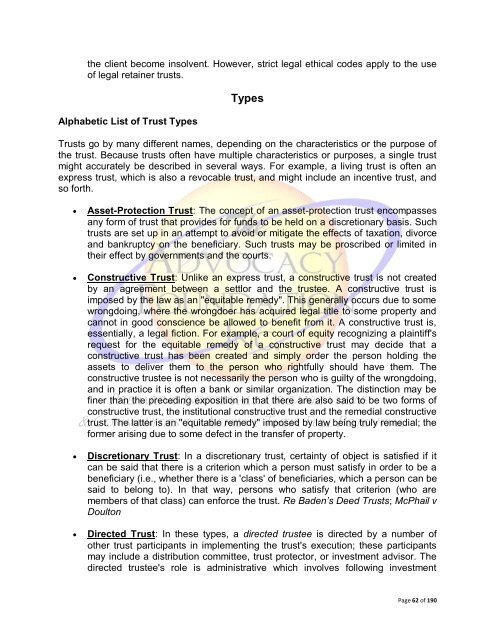Wills, Trusts & Estates
Wills, Trusts & Estates
Wills, Trusts & Estates
You also want an ePaper? Increase the reach of your titles
YUMPU automatically turns print PDFs into web optimized ePapers that Google loves.
the client become insolvent. However, strict legal ethical codes apply to the use<br />
of legal retainer trusts.<br />
Alphabetic List of Trust Types<br />
Types<br />
<strong>Trusts</strong> go by many different names, depending on the characteristics or the purpose of<br />
the trust. Because trusts often have multiple characteristics or purposes, a single trust<br />
might accurately be described in several ways. For ex<strong>amp</strong>le, a living trust is often an<br />
express trust, which is also a revocable trust, and might include an incentive trust, and<br />
so forth.<br />
<br />
<br />
<br />
<br />
Asset-Protection Trust: The concept of an asset-protection trust encompasses<br />
any form of trust that provides for funds to be held on a discretionary basis. Such<br />
trusts are set up in an attempt to avoid or mitigate the effects of taxation, divorce<br />
and bankruptcy on the beneficiary. Such trusts may be proscribed or limited in<br />
their effect by governments and the courts.<br />
Constructive Trust: Unlike an express trust, a constructive trust is not created<br />
by an agreement between a settlor and the trustee. A constructive trust is<br />
imposed by the law as an "equitable remedy". This generally occurs due to some<br />
wrongdoing, where the wrongdoer has acquired legal title to some property and<br />
cannot in good conscience be allowed to benefit from it. A constructive trust is,<br />
essentially, a legal fiction. For ex<strong>amp</strong>le, a court of equity recognizing a plaintiff's<br />
request for the equitable remedy of a constructive trust may decide that a<br />
constructive trust has been created and simply order the person holding the<br />
assets to deliver them to the person who rightfully should have them. The<br />
constructive trustee is not necessarily the person who is guilty of the wrongdoing,<br />
and in practice it is often a bank or similar organization. The distinction may be<br />
finer than the preceding exposition in that there are also said to be two forms of<br />
constructive trust, the institutional constructive trust and the remedial constructive<br />
trust. The latter is an "equitable remedy" imposed by law being truly remedial; the<br />
former arising due to some defect in the transfer of property.<br />
Discretionary Trust: In a discretionary trust, certainty of object is satisfied if it<br />
can be said that there is a criterion which a person must satisfy in order to be a<br />
beneficiary (i.e., whether there is a 'class' of beneficiaries, which a person can be<br />
said to belong to). In that way, persons who satisfy that criterion (who are<br />
members of that class) can enforce the trust. Re Baden’s Deed <strong>Trusts</strong>; McPhail v<br />
Doulton<br />
Directed Trust: In these types, a directed trustee is directed by a number of<br />
other trust participants in implementing the trust's execution; these participants<br />
may include a distribution committee, trust protector, or investment advisor. The<br />
directed trustee's role is administrative which involves following investment<br />
Page 62 of 190

















